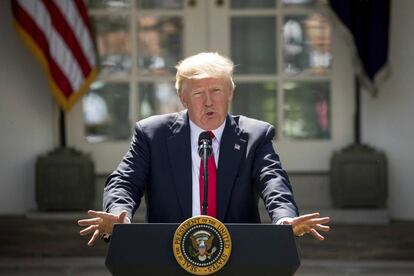Trump’s latest absurdity
The president’s decision to pull the US out of the Paris accord is inexplicable and potentially very damaging

Donald Trump announced yesterday with great paraphernalia that the United States was pulling out of the Paris climate agreement, although his decision to dismantle the federal policies so painfully put together by the Obama administration, and his intention not to comply with the accord, were well known since January.
But the news has generated huge concerns among the international community. In the next few lines I will try to demonstrate that this decision is, to a great extent, inexplicable, and potentially highly damaging.
The mitigation objectives within the deal are easily achievable with changes to the energy sector
Trump’s reasoning is based on the agreement putting the US at a disadvantage, because it supposedly imposes huge demands that could lead to significant economic losses. This is highly debatable: his country has the biggest economy in the world and thus a high economic capacity, and is responsible for a large part of the historic emissions of greenhouse gasses, with one of the highest level of per capita emissions in the world. But above all else, the mitigation objectives within the deal for the US are modest and easily achievable with changes to the energy sector (more renewables and gas, less coal).
Moreover, the country’s climate policies – with several notable exceptions on a state and local level – do not come anywhere near the ambition and sophistication of the packages that the European Union has been putting into action in the last decade. And a large number of American companies are aware of the reputation costs and the loss of markets that this movement will bring with it.
To make matters worse, mining and other similar sectors are not going to achieve additional protection when the US drops out of the deal: renewable energies are ever-more competitive, the days of coal are numbered due to environmental reasons, and in any case, large-scale mechanization is doing away with jobs in these sectors.
But this senseless decision could have anyway profound implications. Firstly, it will make the meeting of the Paris objectives much more difficult: limiting a rise in global temperatures to 2ºC would already have been tough with the US fully involved in the deal, but will be even more so without it. Secondly, a large part of the mitigation and adaptation in developing countries will depend on the arrival of funds agreed on in Paris, for which the contributions of the United States were essential.
To make matters worse, mining and other similar sectors are not going to achieve additional protection when the US drops out of the deal
Of course, this goes much further than the effectiveness of the agreement and demonstrates the scant interest of the Trump administration in international equity and in the protection of the more disadvantaged people on the planet. Finally, given the voluntary nature of the Paris accord, for one of the world’s biggest producers of greenhouse gases and the biggest economy on the planet to leave will generate obvious disincentives for those who stay in, and will make the application of more ambitious policies in this field even more difficult (recall that competitiveness issues have been in the center of EU debates on climate policy reform).
It’s hard to know where we are headed and how governments from the rest of the world should proceed. Obviously the renegotiation of an agreement that already offers a great deal of flexibility and interaction between its signatories is not the way to go. Perhaps now is the moment for level-headedness, of maintaining and strengthening the existing climate policies and those that need to be developed by signatories of the Paris accord, and, above all else, establishing a framework that facilitates the private mobilization of resources in the transition to low-carbon economies. That way it will be possible for industry and research to continue advancing in the fight against climate change, thus making Trump’s decision ever more irrelevant.
Xavier Labandeira is an economics professor at Vigo University and the director of Economics for Energy.
English version by Simon Hunter.
Tu suscripción se está usando en otro dispositivo
¿Quieres añadir otro usuario a tu suscripción?
Si continúas leyendo en este dispositivo, no se podrá leer en el otro.
FlechaTu suscripción se está usando en otro dispositivo y solo puedes acceder a EL PAÍS desde un dispositivo a la vez.
Si quieres compartir tu cuenta, cambia tu suscripción a la modalidad Premium, así podrás añadir otro usuario. Cada uno accederá con su propia cuenta de email, lo que os permitirá personalizar vuestra experiencia en EL PAÍS.
¿Tienes una suscripción de empresa? Accede aquí para contratar más cuentas.
En el caso de no saber quién está usando tu cuenta, te recomendamos cambiar tu contraseña aquí.
Si decides continuar compartiendo tu cuenta, este mensaje se mostrará en tu dispositivo y en el de la otra persona que está usando tu cuenta de forma indefinida, afectando a tu experiencia de lectura. Puedes consultar aquí los términos y condiciones de la suscripción digital.









































